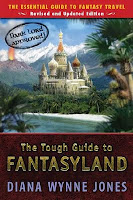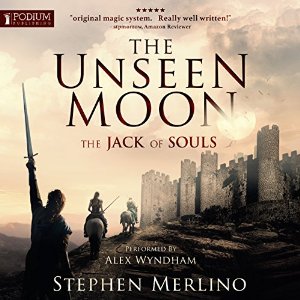This is a fun and wide-ranging interview I gave to Sherri Rabinowitz on her Blog Talk show, “Chatting with Sherri.”
Tag Archives: humor
THE JACK OF SOULS is up for preorder on Audible!
The audiobook for The Jack of Souls is up for preorder on Audible, and it’s freaking fantastic! I am so pleased!
Here’s an audio file of the opening pages. The actor, Alex Wyndham, went with an English accent—probably because of the lofty material, 😉 –and he rocks it! Turns out he’s a great character actor.
Even in the first minute I love what he did with the barman. II can’t wait to hear how he did Caris and Willard and Brolli and Bannus’s voices.
I shall have to subject my kids to it on the road trip to the mountains this weekend. Mwa-hahaha!
A Wonderful Opening Passage – from Douglas Adams
Here’s a humorous treat for you: the opening passage to an essay by Douglas Adams, titled “DNA / Riding the Rays.”
Riding the Rays, by Douglas Adams
Every country is like a particular type of person. America is like a belligerent, adolescent boy, Canada is like an intelligent, 35 year old woman. Australia is like Jack Nicholson. It comes right up to you and laughs very hard in your face in a highly threatening and engaging manner. In fact it’s not so much a country as such, more a sort of thin crust of semi-demented civilisation caked around the edge of a vast, raw wilderness, full of heat and dust and hopping things.
Tell most Australians that you like their country and they will give a dry laugh and say ‘Well, it’s the last place left now isn’t it?’, which is the sort of worrying thing that Australians say. You don’t quite know what they mean but it worries you in case they’re right.
Just knowing that the place is lurking there on the other side of the world where we can’t see it is oddly unsettling, and I’m always looking for excuses to go even if only to keep an eye on it.
For the whole article: http://www.douglasadams.com/dna/980707-08-a.html
Gamer Humor
An Unsympathetic Protagonist – Meditation 1.0
I recently attended an author reading of a humorous supernatural fiction novel that shall remain nameless. After hearing several chapters from the beginning and middle, I found my self thinking, “The main character’s voice is hilarious, but the dude is a douche, a parasite who makes a living ruining other people’s lives; he never shows remorse for it, never justifies it, nor in fact does he ever give us the sense there is need for justification.
It brought up a question I have as a writer that is still not fully resolved. It is based on the assumption that a protagonist must be a sympathetic character. I used to think this meant the reader has to like the main character, or identify with her/him. A wise writer friend of mine suggested that we don’t have to like them, per se–nor particularly identify with them–but we do have to be able to sympathize with them, at least in some small way.
Breaking Bad
I suppose that’s why the protagonist of Breaking Bad was able to keep people with him for x seasons; he was despicable in many ways–more and more as the seasons passed–but viewers sympathized with his troubles and miseries. Likable? No. Sympathetic? Quite.
If I Laugh, Do I Sympathize?
Back to the supernatural novel. The only thing this protagonist had going was that he was funny as hell. His snarky voice made me chuckle. But sympathize? I don’t know.I suppose the roots of the word sympathy mean literally, “to feel with.” I guess if this unlikable protagonist is making jokes and I’m laughing, I’m sympathizing with him–literally “feeling humor with him.”
But that reasoning makes me dizzy and I still don’t feel I sympathized with him.
Not Funny Enough
So I bought the book based on the chuckles I got from the reading, but only read halfway through before I put it down. NOTE TO SELF: Turns out, funny isn’t enough to form that emotional attachment with a protagonist I need to want to spend a lot of time with them.
To be fair, the author seems to have cherry picked some of the funniest passages in the book to read to us, so maybe I lost sympathy simply because the rest just wasn’t funny enough. I was there for the cherry passages of hilarity, then…the ick showed through.
Until I meet another such character who is much funnier, I won’t know the answer.
Corollary Observation: The Comic Get-Out-of-Jail-Free-Card
A funny narrator can get away with much that would spoil a story with an ordinary narrator. for example, info dumps of exposition cause readers to skim ahead, or sigh and doggedly push through in hopes such dumps won’t come often.But I’ve read info-dumps that were so funny I didn’t care at all. My friend Craig has that knack. I could read his exposition all day.
So I remain undecided as to whether an unsympathetic protagonist can be similarly redeemed by being very, very funny.
If you know examples of characters that fit that bill, let me know! I’d love to hear your thoughts below.
World Building Primer: THE TOUGH GUIDE TO FANTASYLAND, by Diana Wynne Jones
One of the best primers on fantasy world building I have seen is Diana Wynne Jones’s Tough Guide to Fantasyland. Wikipedia describes it as a loving sendup of common fantasy tropes, which it is, but it can also beread as a cautionary primer for writers against unexamined fantasy clichés. 
Years ago the book was recommended to me by the leader of Seattle Writer’s Cramp, Steve Gurr, when he pointed out some arbitrary apostrophes I’d inserted into place names or secondary character names in the novel I was submitting for critique at the time. (His point about the apostrophes wasn’t that one ought not use apostrophes in imaginary place names, but that if I am not a linguist, like Tolkien was, I might consider doing that sparingly. (And yes, Jones does have a humorous entry on Apostrophes in the book.)
I read all of Tough Guide to Fantasyland and found numerous inspirations to reconsider elements of my worldbuilding which I had not before examined.
Some of My Favorite Examples
COLOR CODING: is very important in Fantasyland. Always pay close attention to the color of the CLOTHING, hair and eyes of anyone you meet. It will tell you a great deal. Complexion is also important: in many cases it will be color coded too.
1. Clothing. Black garments normally mean EVIL, but in rare cases it may mean sobriety, in which cases a white ruffled collar will be added to the ensemble. Gray and red clothing mean that the person is neutral but ending to EVIL in most cases. Any other color is GOOD, unless too many bright colors are worn at once, in which instance the person will be unreliable. Drab color means the person will take little part in the action, unless the drab is also torn or disreputable, when the person will be a loveable rogue.
2. Hair. Black hair is EVIL, particularly if combined with a corpse-white complexion. Red hair always entails magical POWERS, even if these are only latent. Brown hair has to be viewed in combination with eyes whose color are the real giveaway (see below), but generally implies niceness. Fair hair, especially if it is silver-blonde, always means goodness.
3. Eyes. Black eyes are invariably EVIL; brown eyes mean boldness and humor, but not necessarily goodness; green eyes always entail talent, usually for magic but sometimes for music; hazel eyes are rare and seen generally to imply niceness; gray eyes mean niceness and healing abilities (see HEALERS) and will be reassuring unless they look silver (silver-eyed people are likely to enchant or hypnotize you for their own ends, although they are not always EVIL); white eyes usually blind ones, are for wisdom (never ignore anything a white-eyed person says); blue eyes are always GOOD, the bluer, the more good present; and then there are violet and golden eyes. People with violet eyes are often of Royal, and, if not, always live uncomfortably interesting lives. People with golden eyes just live uncomfortably interesting lives, and are usually rather fey in the bargain. Both these types should be avoided by anyone who wishes for a quiet life. Luckily it seldom occurs to those with undesirable eye colors to disguise them with ILLUSION, and they can generally be detected very readily. Red eyes can never be disguised. They are EVIL and are surprisingly common.
4. Complexion. Corpse-white is evil, and it grades from there. Pink-faced folk are generally midway and pathetic. The best face-color is brown, preferably tanned, but it can be inborn. Other colors such as black, yellow, blue and mauve barely exist.
So, if a character is wearing green, is blue-eyes and brown-faced, you will probably be okay. CAUTION: do not apply these standards to our own world. You are likely to be disappointed.
CLOTHING: Although this varies from place to place, there are two absolute rules:
1. Apart from ROBES, no garment thicker than a SHIRT ever has sleeves.
2. No one ever wears socks.
COATS: do not exist in Fantasyland–CLOAKS being universally preferred–but TURNCOATS do.
CLOAKS: are the universal outer garb of everyone who is not a barbarian. It is hard to see why. They are open in the front and require you at most times to use one hand to hold them shut. … etc.
Amazon Link
Consider reading this aloud to like-minded geek friends.





